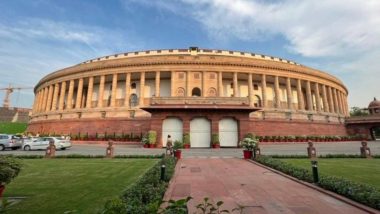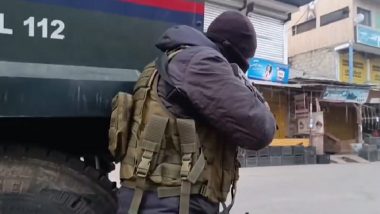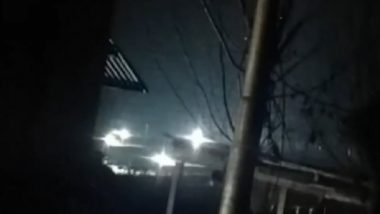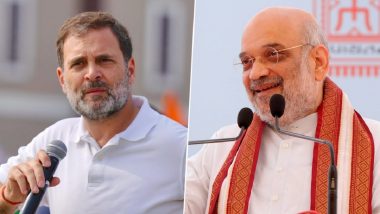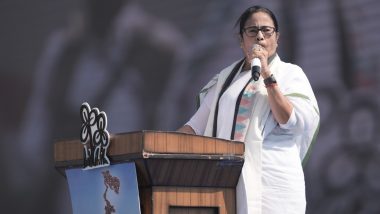New Delhi, July 26: A bill to nominate two members, including a woman, from the Kashmiri migrant community and one member from the displaced persons from Pakistan occupied Kashmir (PoK) to the legislative assembly of the Union Territory of Jammu and Kashmir was introduced in the Lok Sabha on Wednesday.
Introducing the bill on behalf of Union Home Minister Amit Shah, Union Minister of State for Home Nityanand Rai said the bill provides for representation of Kashmiri migrants, displaced persons from PoK and Scheduled Tribes in the legislative assembly of Jammu and Kashmir so as to preserve their political rights as well as their overall social and economic development. Monsoon Session 2023: Bill Introduced in Lok Sabha To Allow Use of Birth Certificate As Single Document for Admission to Educational Institution and Preparation of Voter List.
"The Jammu and Kashmir Reorganisation (Amendment) Bill, 2023 provides for the following, namely: to insert new sections 15A and 15B in the Act so as to nominate not more than two members, one of whom shall be a woman, from the community of Kashmiri Migrants, and one member from Displaced Persons from Pakistan occupied Jammu and Kashmir, to the Legislative Assembly of the Union territory of Jammu and Kashmir; and amendments to sub-sections (3) and (10) of section 14 of the Act which are of consequential in view of completion of delimitation process in the Union territory of Jammu and Kashmir," according to the statement of objects and reasons.
The Jammu and Kashmir Reorganisation Act, 2019 (34 of 2019) was enacted with for the reorganisation of the erstwhile state of Jammu and Kashmir, which was bifurcated into Union territories of Jammu and Kashmir, and Ladakh. The statement of objects and reasons noted that at the time of the militancy in the erstwhile state of Jammu and Kashmir in the late 1980s, particularly in Kashmir in 1989-90, a large number of people migrated from their ancestral places of residence in Kashmir province, particularly the Kashmiri Hindus and Pandits along with a few families belonging to Sikh and Muslim communities.
Initially, all the migrants were moved to Jammu. Later on, some migrants chose to go to other parts of the country, namely Delhi, Bengaluru and Pune. As per the data available with the government of Jammu and Kashmir, there are currently 46,517 families having 1,58,976 persons registered with the Relief Organisation of the government of Jammu and Kashmir, who have got registered over a period of last three decades.
In the wake of the 1947 Pakistani aggression in Jammu and Kashmir, 31,779 families migrated from Pakistan occupied areas of Jammu and Kashmir to the erstwhile state of Jammu and Kashmir. Of these, 26,319 families settled in the erstwhile state of Jammu and Kashmir and the remaining 5,460 moved out of Jammu and Kashmir to other parts of the country. Monsoon Session 2023: Centre Introduces Two Bills for SC, ST in Jammu and Kashmir in Lok Sabha Amid Protest Over Manipur Issue.
Further, during the Indo-Pak wars of 1965 and 1971, 10,065 more families were displaced from Chhamb Niabat area. Of these, 3,500 families were displaced during the 1965 war and 6,565 families during the 1971 war.
As such, a total of 41,844 families were displaced during 1947-48, 1965 and 1971 Indo-Pak wars, according to the statement of objects and reasons.
The delimitation commission, while undertaking the delimitation process of assembly and parliamentary constituencies in the Union Territory of Jammu and Kashmir, received many representations from the Kashmiri migrants as well as from the displaced persons from Pakistan occupied Jammu and Kashmir regarding reservation of seats in the legislative assembly of the Union Territory of Jammu and Kashmir to preserve their political rights and identity, they said.
The delimitation commission, after considering the matter in depth, recommended for representation of communities of Kashmiri migrants and displaced persons from Pakistan occupied Jammu and Kashmir in the legislative assembly of the Union Territory of Jammu and Kashmir by way of nomination, noted the statement of objects and reasons.
As per sub-section (4) of section 14 of the Jammu and Kashmir Reorganisation Act, 2019, 24 seats in the legislative assembly of the Union Territory of Jammu and Kashmir have been reserved for the people residing in the area of the Union Territory of Jammu and Kashmir under illegal occupation of Pakistan.
The said seats shall remain vacant until the area under the occupation of Pakistan ceases to be occupied and the people residing in that area elect their representatives. The representation of the Kashmiri migrants and the displaced persons from Pakistan occupied Jammu and Kashmir in the legislative assembly of the Union Territory of Jammu and Kashmir shall be given on lines of section 15 of the Act, which provides for the representation of women, according to the statement of objects and reasons.
On completion of delimitation process, the delimitation commission had published orders with regard to the delimitation of the assembly and parliamentary constituencies of Jammu and Kashmir. As per these orders, the number of seats in the legislative assembly of Jammu and Kashmir has been increased from 107 to 114 with reservation of nine seats for Scheduled Tribes for the first time.





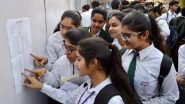



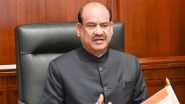



 Quickly
Quickly








